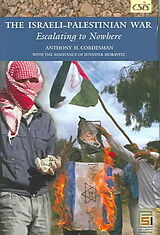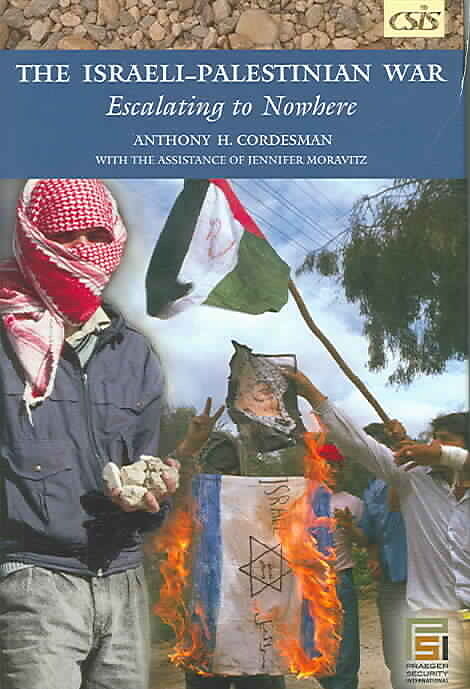The Israeli-Palestinian War
Einband:
Fester Einband
EAN:
9780275987589
Untertitel:
Escalating to Nowhere
Genre:
Politikwissenschaft
Autor:
Anthony Cordesman
Herausgeber:
Praeger
Anzahl Seiten:
568
Erscheinungsdatum:
30.10.2005
ISBN:
0275987582
Informationen zum Autor Anthony H. Cordesman holds the Arleigh A. Burke Chair in Strategy at Center for Strategic and International Studies in Washington DC, USA. He formerly served as national security assistant to Senator John McCain of the Senate Armed Services Committee, as director of intelligence assessment in the Office of the Secretary of Defense, and as civilian assistant to the deputy secretary of defense.ANTHONY H. CORDESMAN is Senior Fellow at the Center for Strategic and International Studies and a military analyst for ABC News. A frequent commentator on National Public Radio, he is the author of numerous books on security issues and has served in a number of senior positions in the US government.ANTHONY H. CORDESMAN is Senior Fellow at the Center for Strategic and International Studies and a military analyst for ABC News. A frequent commentator on National Public Radio, he is the author of numerous books on security issues and has served in a number of senior positions in the US government. Klappentext The Israeli-Palestinian conflict is more than a local or regional dispute. Its ongoing and escalating nature increases the risk that the violence will spill over its present borders and contribute to both extremism and terrorism. While the Intifada from 1987 to 1993 was largely a popular uprising and a political struggle, the recent clash is a war with a steady escalation between conventional and unconventional forces. It is in the interest of all major powers, the international community, and the United Nations to press both sides to accept a realistic peace plan. Noted Middle East expert Anthony Cordesman details this continuing struggle by explaining the issues at stake for each side; the various combatants (both directly and indirectly engaged); as well as the course of the war in its various incarnations. The situation on the ground is complex and the quest for peace is ever more uncertain. If the Intifada was a struggle for recognition that a peace had to be reached that was just for both sides, the Israeli-Palestinian War has polarized both sides away from peace, convincing them of the justice of their own cause and tactics and the fundamental injustice of the other side's tactics and goals. Each side has used human rights, international law, and civilian casualties as political weapons. The history of a near century of conflict is used to justify war rather than a search for peace. Zusammenfassung If the Intifada was a struggle for recognition that a peace had to be reached that was just for both sides! the Israeli-Palestinian War has polarized both sides away from peace! convincing them of the justice of their own cause and tactics and the fundamental injustice of the other side's tactics and goals. Inhaltsverzeichnis IntroductionFrom Peace to War: Land for Peace or Settlements for War?From Peace to War: Terrorism for SettlementsThe Final Settlement Issues: Asymmetric Values and Asymmetric WarfareThe Collapse of the Peace ProcessThe Actors in the Conflict: The Israeli Defense ForcesThe Actors in the Conflict: The Palestinian Factions that Challenge Peace and the Palestinian AuthorityThe Outside Actors that Have Shaped the Israeli-Palestinian ConflictFighting and Failed Peace EffortsCasualty Trends and the Costs of the WarThe IDF Focus on Isolation, Containment, and the Selective Use of Conventional Military PowerThe Palestinian Response: The Battle for Public Opinion and the Challenge of Reforming the Palestinian AuthorityThe Course of Conflict in GazaThe Course of the Conflict in the West Bank and "Greater Jerusalem"Conflict in Israel ProperThe Continuing Hope for Peace: The Quartet and the "Road Map"...
Autorentext
Anthony H. Cordesman holds the Arleigh A. Burke Chair in Strategy at Center for Strategic and International Studies in Washington DC, USA. He formerly served as national security assistant to Senator John McCain of the Senate Armed Services Committee, as director of intelligence assessment in the Office of the Secretary of Defense, and as civilian assistant to the deputy secretary of defense. ANTHONY H. CORDESMAN is Senior Fellow at the Center for Strategic and International Studies and a military analyst for ABC News. A frequent commentator on National Public Radio, he is the author of numerous books on security issues and has served in a number of senior positions in the US government. ANTHONY H. CORDESMAN is Senior Fellow at the Center for Strategic and International Studies and a military analyst for ABC News. A frequent commentator on National Public Radio, he is the author of numerous books on security issues and has served in a number of senior positions in the US government.
Klappentext
The Israeli-Palestinian conflict is more than a local or regional dispute. Its ongoing and escalating nature increases the risk that the violence will spill over its present borders and contribute to both extremism and terrorism. While the Intifada from 1987 to 1993 was largely a popular uprising and a political struggle, the recent clash is a war with a steady escalation between conventional and unconventional forces. It is in the interest of all major powers, the international community, and the United Nations to press both sides to accept a realistic peace plan.
Noted Middle East expert Anthony Cordesman details this continuing struggle by explaining the issues at stake for each side; the various combatants (both directly and indirectly engaged); as well as the course of the war in its various incarnations. The situation on the ground is complex and the quest for peace is ever more uncertain. If the Intifada was a struggle for recognition that a peace had to be reached that was just for both sides, the Israeli-Palestinian War has polarized both sides away from peace, convincing them of the justice of their own cause and tactics and the fundamental injustice of the other side's tactics and goals. Each side has used human rights, international law, and civilian casualties as political weapons. The history of a near century of conflict is used to justify war rather than a search for peace.
Zusammenfassung
If the Intifada was a struggle for recognition that a peace had to be reached that was just for both sides, the Israeli-Palestinian War has polarized both sides away from peace, convincing them of the justice of their own cause and tactics and the fundamental injustice of the other side's tactics and goals.
Inhalt
Introduction From Peace to War: Land for Peace or Settlements for War? From Peace to War: Terrorism for Settlements The Final Settlement Issues: Asymmetric Values and Asymmetric Warfare The Collapse of the Peace Process The Actors in the Conflict: The Israeli Defense Forces The Actors in the Conflict: The Palestinian Factions that Challenge Peace and the Palestinian Authority The Outside Actors that Have Shaped the Israeli-Palestinian Conflict Fighting and Failed Peace Efforts Casualty Trends and the Costs of the War The IDF Focus on Isolation, Containment, and the Selective Use of Conventional Military Power The Palestinian Response: The Battle for Public Opinion and the Challenge of Reforming the Palestinian Authority The Course of Conflict in Gaza The Course of the Conflict in the West Bank and "Greater Jerusalem" Conflict in Israel Proper The Continuing Hope for Peace: The Quartet and the "Road Map"

Leider konnten wir für diesen Artikel keine Preise ermitteln ...
billigbuch.ch sucht jetzt für Sie die besten Angebote ...
Die aktuellen Verkaufspreise von 6 Onlineshops werden in Realtime abgefragt.
Sie können das gewünschte Produkt anschliessend direkt beim Anbieter Ihrer Wahl bestellen.
Loading...
Die aktuellen Verkaufspreise von 6 Onlineshops werden in Realtime abgefragt.
Sie können das gewünschte Produkt anschliessend direkt beim Anbieter Ihrer Wahl bestellen.
| # | Onlineshop | Preis CHF | Versand CHF | Total CHF | ||
|---|---|---|---|---|---|---|
| 1 | Seller | 0.00 | 0.00 | 0.00 |
